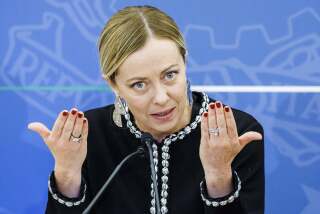REFORM : Italy Poised to Launch Era of Electoral Change
- Share via
ROME — At a moment of national anxiety, Italy takes the first step Sunday in the long-sought overhaul of its electoral system with direct election of mayors in 40 cities up and down the country.
Vexed by old scandals and new terrorism, voters are expected to once again rebuff Establishment parties that have ruled the country since the end of World War II.
For the first time, mayoral candidates will be elected by the people, rather than powerbroker city council members. More, the new mayors will be elected as individuals, rather than as party representatives. If no majority is forthcoming Sunday in any given city, a runoff will be held between the two top finishers on June 20.
The elections come against a backdrop of renascent terrorism that seems aimed at destabilizing Italy as it seeks a new political course.
In recent weeks, car bombs have exploded in Rome and Florence, killing five people, wounding several dozen and damaging the Uffizi Gallery, one of the world’s great cultural landmarks. A third car wired with explosives was discovered and disarmed near Parliament in Rome on Wednesday.
The Mafia, sorely wounded in recent months by the arrest of key leaders, is among the suspects in the bombings. But police say, frankly, they have few good leads. Election security will be especially tight.
Winning candidates will also carry to office 60% of the city council in an attempt to end the sort of weak multi-party coalitions that have also stalked Italy’s national administration.
For many observers, Sunday’s election is something of a leap into the dark. The Rome newspaper La Repubblica said it promises “a political tornado of unimaginable dimensions. . . . The political geography of the country will be rewritten.”
The biggest cities to vote Sunday are rich, industrial Milan and Turin in the north and the Sicilian city of Catania, known for its industry--and its organized crime. Other major cities going to the polls include Ravenna, Siena, Ancona, and Agrigento in Sicily.
One pre-election poll predicts disaster in Milan for the scandal-tarred Socialist Party, a political favorite for decades in Italy’s dynamic business capital.
It was in Milan last year that magistrates first broke open what was to become a national corruption scandal of unprecedented proportions. Almost 3,000 public officials and business people have been implicated so far in the continuing probe of payoffs and bribes for public contracts.
In Milan, it is new names that most excite voters, pollsters say. The two leading candidates are Nando Dalla Chiesa, the son of an army general murdered by the Mafia, who represents a Sicilian-born anti-Mafia party called La Rete; and Marco Formentini, parliamentary leader of the Lega Nord, a populist movement that despises the corrupt and unwieldy bureaucracy of Italy’s Rome-based government and calls for greater regional autonomy.
The Socialists have long been national and local coalition allies with Italy’s dominant Christian Democrats, now also targets of voters’ ire.
Catania has long been ruled by the two parties. But they haven’t fielded a credible mayoral candidate.
Pre-election favorites there include a member of the small, centrist Republican Party and the candidate of the neo-fascist Italian Social Movement.
One electoral bellwether is that many leading candidates have never had connections with traditional parties.
In some cases, their candidacies have been advanced by ad-hoc alliances and concerned citizens, a novelty in a country where many voters have become apathetic after so many years of having no direct say in their city government.
The new municipal electoral system was approved this spring by Parliament.
More to Read
Sign up for Essential California
The most important California stories and recommendations in your inbox every morning.
You may occasionally receive promotional content from the Los Angeles Times.










